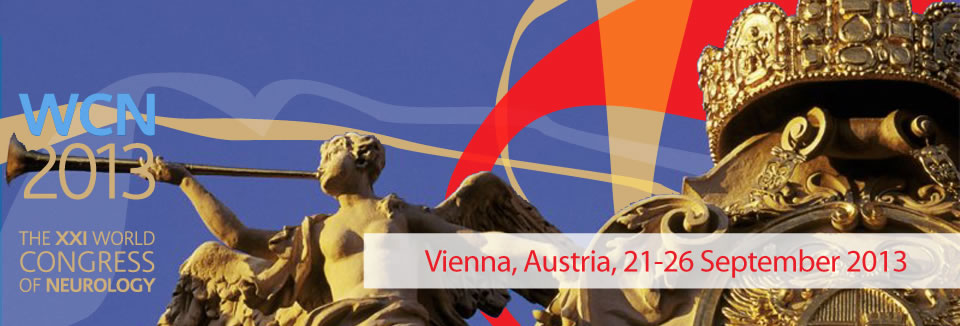 Interview with WFN President
Interview with WFN President
Prof. Vladimir Hachinksi, President of the World Federation of Neurology, discusses the exciting new activities of the organization and highlights of the upcoming XXI World Congress of Neurology in Vienna.
1. Q: Please tell us about why you entered the field of neurology.
A: Although I was always intrigued by the brain, my becoming a neurologist was what I like to call a happy accident. During my time in Montreal, I was assigned to a radiology-based investigation unit. However, the radiologists were on strike at the time and I was thus re-assigned to neurology. I knew from that point on that a career in neurology would be my future.
2. Q: What is the mission of the World Federation of Neurology and the priorities of the current administration?
A: Under the current administration, the World Federation of Neurology has expanded its scope "to foster quality neurology and brain health worldwide".
In order to affect such a change in emphasis, we formed a World Brain Alliance, as brain health is key to health. The Alliance is founded on 3 premises. First, brain health is key to health. Second, brain health begins with the mother and child and their education. Third, our brains are our future. In a knowledge-based society, we must develop a higher degree of intellectual competence in order to make the most of life lived in the digital age.
3. Q: What are some of the scientific highlights expected at the XXI World Congress of Neurology? How is the WFN vision incorporated into the scientific program?
A: The theme of the XXI World Congress of Neurology is "Neurology in the Age of Globalization". The scientific program will build on this theme through stimulating sessions and in-depth cooperation of various brain specialty organizations.
As a result of the World Brain Alliance and the close cooperation of its members, this year we will introduce - for the first time - co-sponsored sessions with several brain specialty organizations.
Another guaranteed highlight will be the Presidential Symposium, which will focus on global neurology and brain health. Prof. Eduard Auff, President of WCN, will address the theme of neurology in our increasingly globalized world. I will contribute to the session with some thoughts about the World Brain Alliance and how we can further promote brain health worldwide.
4. Q: Can you tell us about the speakers and specific expertise to be presented at WCN 2013?
A: I would like to highlight a special speaker who will be featured at the congress and that is Nobel Prize winner Prof. Eric Kandel, who is acclaimed for his work on memory. Prof. Kandel's The Age of Insight elegantly argues that the proliferation of philosophy and science in Vienna in the 19th century had a
profound influence on shifting the prevailing paradigm, from describing disease to an examination of the brain. As a matter of fact, Prof. Kandel was born in Vienna and it is an absolute privilege to have him as one of WCN's main speakers.
5. Q: Are there any breakthroughs or new insights in the field of neurology that will be revealed at the XXI World Congress of Neurology?
A: I would say that WCN is the first congress ever to address brain health as a priority. We will discuss the growing role of brain physicians and scientists to this fascinating specialty.
We also expect a great deal of progress to be made simply by sharing what we already know across the different specialties.
6. Q: Please discuss the significance of EFNS, OGN and WCN being held together in 2013.
A: This is a wonderful example of collaboration. The Austrian Society of Neurology and the European Federation of Neurological Societies are partnering with us in place of their usual annual meetings, which is a very good example of how the neurological world is coming together. I would like to highlight the main protagonists who have facilitated this development: Prof. Auff, President of the Congress and Prof. Richard Hughes, President of EFNS.
7. Q: Please tell us more about the Tournament of the Minds and how it contributes to an enriched congress experience for participants.
A: The format is like Jeopardy and it is great fun! With different teams competing, Tournament of the Minds allows people from around the world to interact and teach one another by sharing their unique experiences.
It is worth noting that in North America and Europe, neurologists tend to specialize and sub-specialize, becoming experts in a particular area. However, in most other regions, neurologists tend to practice general neurology. As a result, their clinical experience tends to be richer and more diverse.
8. Q: How will medical specialists from around the world benefit from attending the XXI World Congress of Neurology?
A: All attendees will benefit by gaining access to state of the art knowledge in all of the relevant areas of neurology as well as detailed insights into the new role of neurologists as guardians of the brain.
However, the congress is geared not only towards neurologists, but to anyone who is interested in the brain.
True to the global character of WFN, the congress scientific program will feature speakers from different parts of the world who are recognized for their ability to clearly convey important information.




